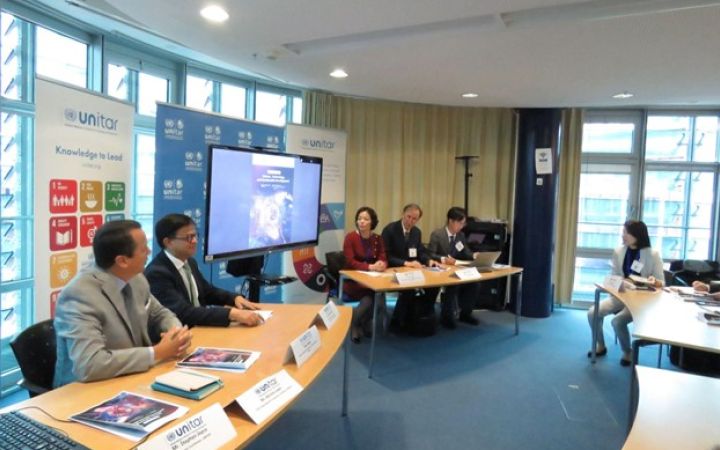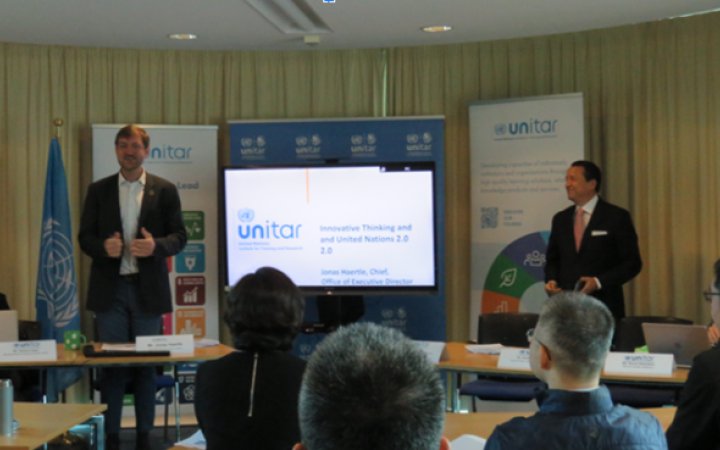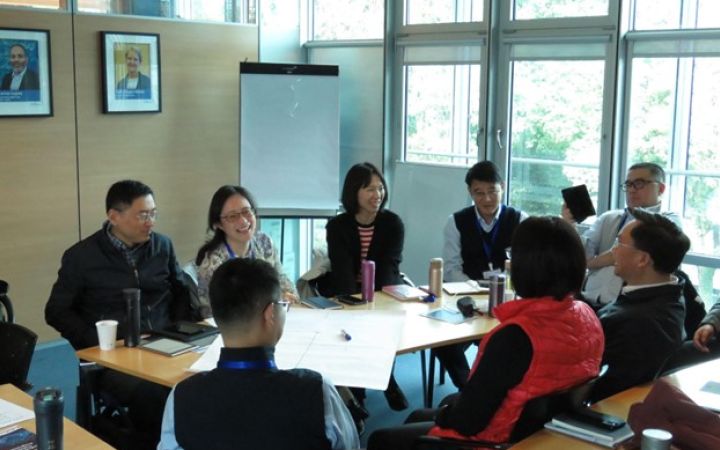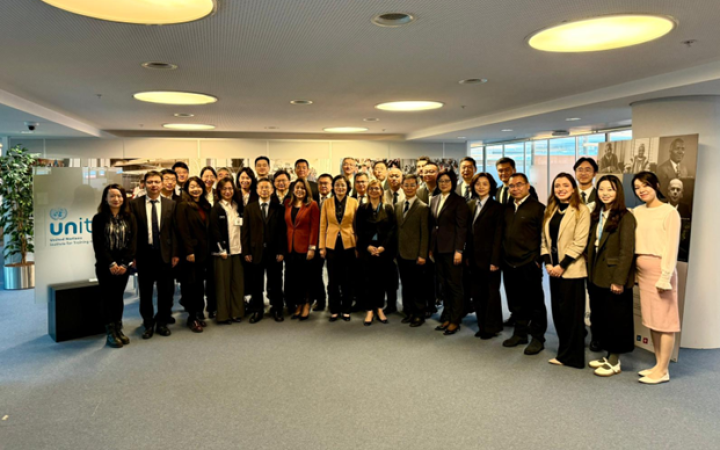Geneva, Switzerland - Between 9-27 September 2024, 25 senior government officials from the Municipality of Shanghai participated in the 'Science, Technology, and Sustainable Development Training Programme'. The programme organized by the United Nations Institute for Training and Research (UNITAR) and CIFAL Shanghai, offered a comprehensive platform for senior government officials to deepen their understanding of global trends in science, technology, and sustainable development. This programme, supported by the State Administration of Foreign Experts Affairs, aimed to cultivate leaders to equip themselves with a global perspective, renowned expertise, and access to international resources. Participants gain valuable insights into the crucial role science and technology play in addressing global challenges and contributing to sustainable growth.
The week-long training programme between 9-13 September 2024, included a diverse array of sessions and study visits that emphasized the importance of science, technology, and innovation in driving sustainable development.
Day 1 began with an opening ceremony of the programme led by Mr Nikhil Seth, United Nations Assistant Secretary-General and Executive Director of UNITAR, Ms Xu Jing, Deputy Secretary General of the Shanghai Jing'an District People's Government, and Mr Genxiang Wang, Director, CIFAL Shanghai. In his opening remarks, Mr. Seth stated,
"I must convey my appreciation to the People's Republic of China for its ability to innovate and create technology in China, and across the world [...] economic progress is not enough, social progress is not enough, environment sustainability is not enough. The most important thing is strong innovative technologies to ensure that our commitment to sustainable development is shared with our peers in the science and technological communities. With the scientific and technological hub in Shanghai, we applaud you for all the contributions you have provided us thus far, and look forward to the progress yet to come".
The first session of the programme led by Mr. Alex Mejia, Director of the Division for People and Social Inclusion provided participants with a comprehensive understanding of the United Nations' functions, Agenda 2030, and the role of UNITAR in fostering sustainable development globally. Upon examining these foundations of the UN, Ms. Mihoko Kumamoto, Director of the Division for Prosperity at UNITAR explored with participants how technological advancements can directly contribute to achieving the SDGs, which stimulated an open discussion on innovation's role in fostering sustainability, economic growth, and social inclusion.
Following the sessions of the first day of the programme, participants engaged in a tour of the Palais des Nations during the 57th session of the Human Rights Council, to contextualize their learning of the multilateral environment in UN Geneva.
The second day of the seminar begins with Mr. Jonas Haertle, Chief, Executive Director's Office at UNITAR to introduce participants to innovative thinking within the context of a modernized UN system. Mr. Haertle explored the role of UN 2.0, and how technology and governance reforms can shape future global and local decision-making processes. Additionally, the second speaker of the day, Dr Geoff Ibbotson, Executive Director of the Global Surgery Foundation, discussed how digital health innovations like the SurgeHub can revolutionize healthcare access and improve outcomes in under-resourced areas. During this session, participants were encouraged to reflect on the intersection of digital health, and sustainable development to consider the impact such technology can have in the People's Republic of China, and beyond.
The third day of the seminar led by Mr Mejia focused on how public policy can be crafted to foster science and technology-led sustainable development. Mr. Mejia emphasized the role of building supportive ecosystems in public policy to encourage research, development, and the commercialization of new technologies that can advance sustainable innovations, and infrastructure.
The second topic of the day led by Dr. Ebru Canan-Sokullu, Associate Director, CIFAL Global Network at UNITAR led an insightful discussion on how digital economies can drive socio-economic growth. This session highlighted strategies that integrate innovation with sustainable development efforts, providing case studies and best practices from around the world for the participants to consider.
Following these presentations, participants were led on a guided tour of CERN, the European Organization for Nuclear Research to provide them the unique opportunity to witness cutting-edge scientific research and its applications in fostering innovation.
Day four began with Mr. Kjartan Sorenson, Senior Programme Specialist, at UNITAR providing a stimulating tutorial on UNITAR and UNCTAD's Digital Academy. The Academy equips civil servants with the skills and knowledge needed to prototype, implement, operate, and expand the use of user-centric digital government systems. Sorenson's tutorial provided an in-depth presentation on the role of the pilot project that the Digital Academy has since implemented in Kenya, which has provided an exceptional delivery of e-government tools for the nation.
The second session of the day was led by Mr. Luca Dell-Oro, Senior Programme Specialist at UNOSAT on the role of 'Enhancing Climate and Disaster Resilience through Satelite Imagery and Geospatial Technologies'. During Dell-Oro's session, he examined the role of UNOSAT in using innovative earth observation technology, emergency mapping services, satellite-driven flood impact analysis, and space applications and capacity development to build climate and disaster resilience.
On the last day of the training programme, Mr Mejia discussed the role of 'Environmental, Social, Governance (ESG) and Sustainable Development' in guiding decision-making processes that balance economic growth with environmental sustainability, social progress, and strong governance structures. By emphasizing these principles, Mr.Mejia highlighted how responsible innovation, supported by science and technology, can address global challenges such as climate change, inequality, and infrastructure development, ensuring long-term sustainable growth. Upon completion of each of the training seminars, participants engaged in a SWOT analysis led by Mr Stephen Joyce, Individual Contractor, UNITAR, to identify internal strengths and weakness, as well as external opportunities and threats, related to Shanghai's efforts to become a globally influential Science and Technology Innovation hub.
Following the first week of the training programme, the participants engaged in several activities during a two-week immersion trip across Switzerland. These activities consisted of exploring Swiss traditions and academic leadership through the advancement of technology from visits to Zermatt, to the precision manufacturing at the Patek Philippe Museum, as well as institutions like Du Rhône Chocolatier, and Ecole Polytechnique Federale de Lausanne. Moreover, the participants engaged in further field visits to organizations like the Permanent Mission of the People's Republic of China, WTO, and Roche Basel Headquarters focused on trade leadership and healthcare innovation, and additionally to academic institutions like ETH Zurich to discuss cutting-edge fields such as quantum technology and sustainable development.
The programme concluded with a graduation ceremony in Geneva, at UNITAR's headquarters where senior government officials received their certificates of completion from Dr. Canan-Sokullu. The immersive training programme provided participants with valuable insights into how Switzerland fosters innovation and sustainable development across various sectors for the senior government officials to consider in enhancing Shanghai's long-term technological development strategy, and its competitiveness as a global leader in the technological sector.
In the closing remarks, Mr. Yugang Wu, Deputy Director, CIFAL Shanghai stated
"This training programme focusing on science, technology, and innovation gave our group a better understanding of the connection of those topics with the UN and SDGs. I firmly believe this programme will contribute to creating more innovative talent in Shanghai. On behalf of CIFAL Shanghai, thank you to all the leaders, and facilitators that contributed to making this training programme a great success".










